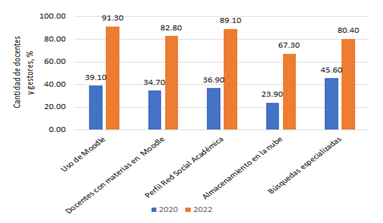Advances on the path of digital competencies in university teachers and managers. A look from Agricultural Sciences
Main Article Content
Abstract
The main objective of this work was to develop digital skills in university teachers and managers and within the reach of some transformations for the fulfillment of the institutional objectives established for the five-year period 2021-2025 at the Agrarian University of Havana (UNAH) that demonstrate an impact of the higher education institution. For this, it was first necessary to identify through a diagnosis the training needs in digital skills of teachers and managers, of the Faculty of Technical Sciences of UNAH and then implement a methodological strategy based on the results of the diagnosis that includes different forms of training. for teachers and university administrators. The results achieved show a qualitative and quantitative leap in the results achieved by teachers, reflected in the use and quantity of subjects on the Moodle platform, in the percentage increase of teachers with academic profiles that have improved the visibility of the institution in only one year, as well as the percentage of teachers and managers who use the cloud as storage space and who consider specialized search strategies in investigative processes.
Article Details

This work is licensed under a Creative Commons Attribution-NonCommercial 4.0 International License.
Los autores que publican en esta revista están de acuerdo con los siguientes términos:
- Los autores conservan los derechos de autor y garantizan a la revista el derecho de ser la primera publicación del trabajo al igual que licenciado bajo unaCreative Commons Attribution-NonCommercial 4.0 Unported License esto significa que se permite su copia y distribución por cualquier medio, siempre que se mantenga el reconocimiento de sus autores y no se haga uso comercial de las obras. El envio de manuscritos, el procesamiento y la publicación no ofrecen ningún coste a los autores, es totalmente gratis.

This journal is licensed under a Creative Commons Attribution-NonCommercial 4.0 Unported License.
References
Cuetos Revuelta, M. J., Grijalbo Fernández, L., Argüeso Vaca, E., Escamilla Gómez, V., & Ballesteros Gómez, R. (2020). Potencialidades de las TIC y su papel fomentando la creatividad: percepciones del profesorado. RIED. Revista Iberoamericana de Educación a Distancia, 23(2). https://doi.org/10.5944/ried.23.2.26247
European Commission. (2020). Digital Education Action Plan 2021-2027. European Commission, 20. https://ec.europa.eu/education/sites/default/files/document-library-docs/deap-communication-sept2020_en.pdf
Gallardo Fernández, I. M., De Castro Calvo, A., & Saiz Fernández, H. (2020). Interacción y uso de tecnologías en los procesos de enseñanza y aprendizaje. Educatio Siglo XXI, 38(1 Marzo-Ju), 119–138. https://doi.org/10.6018/educatio.413441
Pozú-Franco, J., Fernández-Otoya, F. A., & Muñoz-Guevara, L. (2021). Valoración de las competencias digitales en docentes universitarios. Revista Psicológica Herediana, 13(1). https://doi.org/10.20453/rph.v13i1.3850
Prendes Espinoza, M. P., Gutierrez Porlán, I., & Martinez Sanchez, F. (2016). Competencia digital: unanecesidad del profesorado universitario en el siglo XXI. RevistadeEducaciónaDistancia, 56(7). https://doi.org/http://dx.doi.org/10.6018/red/56/7
Ruiz Ortiz, L., Aballe Pérez, V., & Blanco Pérez, A. (2016). MODELO DE EDUCACIÓN A DISTANCIA DE LA EDUCACIÓN SUPERIOR CUBANA. http://moodle.uho.edu.cu/plugingfile.php/32522/mod_resource/content/1/mModelo de Educación a Distancia.pdf
